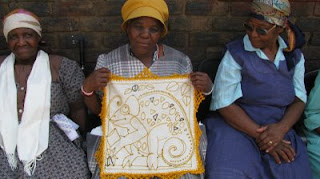 Refilwe is run on the cluster foster-home plan. Carefully screened godparents bring their own children to live in one of the three-bedroomed brick houses strung like beads along the river bank. They share their home and family life with a handfull of foster children. Each household has it's own vegetable garden. The community also runs income generating projects like livestock and a plant nursery. The clinic and the creche serve the near-by informal settlement (squatter camp) giving all a chance at a better life.
Refilwe is run on the cluster foster-home plan. Carefully screened godparents bring their own children to live in one of the three-bedroomed brick houses strung like beads along the river bank. They share their home and family life with a handfull of foster children. Each household has it's own vegetable garden. The community also runs income generating projects like livestock and a plant nursery. The clinic and the creche serve the near-by informal settlement (squatter camp) giving all a chance at a better life.I went to Refilwe to talk with godparents and teachers from the creche about (what else?) reading with children. The godmothers arrived first, and we had an informal time. Most of their children are school age; many are teens. We talked about turning off the television, reading aloud with the younger ones while the older ones listen in, leaving good books around for children to pick up, and modeling an eagerness to read. One of the godmothers mentioned a book her teens had been passing around that had led to spirited discussion--a good reason to promote reading among the children.
 When the creche teachers arrived, we discussed why read at all, and I demonstrated ways of involving small children in the story. They were thrilled with the books I brought as examples. Rosebank Union Church, who sponsored my visit, will work with them on a project to get books for the program.
When the creche teachers arrived, we discussed why read at all, and I demonstrated ways of involving small children in the story. They were thrilled with the books I brought as examples. Rosebank Union Church, who sponsored my visit, will work with them on a project to get books for the program.The creche had been having story time once a week. "We could be reading three times a week," the director commented in the discussion afterward. "Or maybe even every day right before lunch." If she follows through, the lives of these children will be changed forever.













